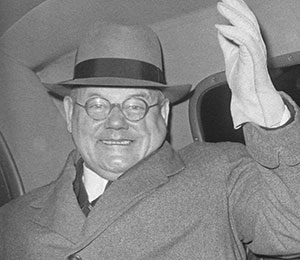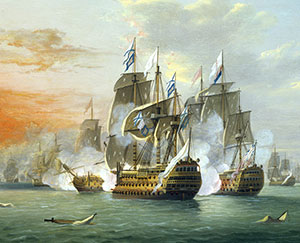ON THIS DAY
Published in Issue 2 (March/April 2020), News, Volume 28BY AODHÁN CREALEY
MARCH
18/1957

Above: Antrim-born Dr John Bodkin Adams—‘a mercenary mercy killer’, according to his trial judge, Lord Devlin.
The trial of Antrim-born Dr John Bodkin Adams on a charge of murdering Edith Morell, one of his elderly patients, opened at the Old Bailey. A lifelong bachelor, Adams was for many years a popular and familiar figure driving around the more affluent areas of Eastbourne, East Sussex, in his Rolls Royce, attending a large number of rich widows. The chattering classes became increasingly concerned, however. He was lavish in prescribing heroin and morphia, and it was noticed that many of his elderly patients improved after they moved away from his care whilst many others died unexpectedly, leaving him gifts and legacies—no less than 132, it later emerged—in their wills. Though it was rumoured that the police were looking at no less than 300 suspicious deaths, he was eventually charged with only one and was acquitted thanks to a brilliant defence team, questionable medical evidence and, crucially, his avoidance of cross-examination. He was later convicted for forging prescriptions and failing to keep proper drugs records and was struck off the medical register. Commenting many years later, the trial judge, Lord Devlin, said that he was probably ‘a mercenary mercy killer’, not entirely motivated by money but greedy all the same. Reinstated as a GP four years later and considerably enriched by thirteen successful libel actions, he continued to practise until his death in 1983, leaving the princely sum of £402,907 in his will. Amongst the 47 beneficiaries were twenty lady friends, his chums in the local clay pigeon shooting club, his housekeeper, his chauffeur and his grocer. And his own doctor got a few pounds as well.
05/1940
The Katyn massacre of c. 22,000 Polish military officers and intelligentsia was initiated by the NKVD—the Soviet secret police—with the approval of the Soviet politburo led by Joseph Stalin.
10/1920
The Government of Ireland Bill, offering a six-county ‘Northern Ireland’, was accepted by a two to one majority by the Ulster Unionist Council.
Six IRA prisoners were executed in Dublin, four of whom were convicted of high treason for levying war.
16/1820
John Scanlon was executed in Limerick for the murder of Ellen Hanley (15), ‘the Colleen Bawn’, the previous summer.
18/1940
Roderick O’Conor (79), Roscommon-born painter who spent most of his later years in Paris and as part of the Pont-Aven movement, died.
19/1870
The first instalment of Charles Kickham’s immensely popular Knocknagow or The Homes of Tipperary appeared in The Shamrock magazine. It was published as a novel in 1879.
20/1920
Tomás MacCurtain, Sinn Féin lord mayor of Cork and commander of the 1st Cork Brigade of the IRA, was shot dead at his home. A subsequent coroner’s jury found that the murder had been organised and carried out by the RIC.
21/1920
An t-Athair Peadar Ó Laoghaire (81), scholar and author, notably of Mo scéal féin (1915), died.
21/1960
Sixty-nine people were killed and 189 others injured when police opened fire on a crowd of c. 5,000–7,000 protesting against pass laws outside the police station in the South African township of Sharpeville.
26/1920
Alan Bell, a magistrate investigating funding of the republican movement, was shot dead by Michael Collins’s ‘squad’.
26/2000
Vladimir Putin, who had served as a KGB foreign intelligence officer for sixteen years, was elected president of Russia in succession to Boris Yeltsin.
28/1820
Sir William Howard Russell, one of the first modern war correspondents, whose coverage included the Crimean War and the American Civil War, born in Tallaght, Dublin.
APRIL
12/1782

Above: The Battle of the Saints—British Admiral George Rodney’s victory over a French fleet inspired Kerryman Eoghan Rua Ó Súilleabháin to compose ‘Rodney’s Glory’, to this day a mainstay of the traditional singer’s repertoire.
The Battle of the Saints, off Dominica. A British fleet under Admiral George Rodney routed a French fleet under the Comte de Grasse as it sailed to join the Spanish for an attack on British Jamaica. On board the Endeavour that day was Kerryman Eoghan Rua Ó Súilleabháin (‘Eoghan of the Sweet Mouth’), one of the last of the great Gaelic poets. Wandering for many years around Munster as a labourer and sometime schoolmaster, he was eventually engaged as a tutor by the Nagle family near Fermoy until he was discovered ‘misconducting himself’ with Mrs Nagle. Chased by her husband, he sought refuge in Fermoy barracks, where, he later insisted, he was press-ganged into His Majesty’s navy. In any event, with the battle won and in the hope of gaining a discharge, Eoghan Rua composed ‘Rodney’s Glory’, his famous eulogy to the martial glories of Great Britain and Admiral Rodney:
‘Come all you Britons stout and bold
Who scorns now to be controu’d
Good news unto you I will unfold
It is of brave Rodney’s glory’
—to this day a mainstay of the traditional singer’s repertoire. But if his verses delighted the bold Rodney they failed to elicit the desired discharge. Rodney was afterwards granted a peerage and an annual pension of £2,000, and died some ten years later in bed in his stately pile. No such luck for Eoghan Rua. Discharged some two years later, he returned to Kerry and opened a school, but died shortly afterwards at the age of 35 from fever after being struck by a pair of tongs in an alehouse fracas.
03/1970
Garda Richard Fallon (42) was shot dead as he attempted to prevent a bank robbery by the republican splinter group Saor Éire on Arran Quay, Dublin.
11/1770
George Canning, Tory statesman and prime minister for the final 118 days of his life, who described himself as ‘an Irishman born in London’, born to George Canning, a failed wine merchant and lawyer from Garvagh, Co. Derry, and Irish actress Mary Ann Costello.
12/1820
Arthur Young, major English writer on agriculture best known as a social and political observer, author notably of Tour in Ireland (1780), died.
13/1970
A potentially lethal oxygen tank failure on board Apollo 13 forced the cancellation of a planned moon landing. The three-man crew returned safely to earth four days later.
14/2010
Volcanic eruptions at Eyjafjallajokull in Iceland covered large areas of northern Europe in ash, forcing some twenty countries to close their airspace. Some ten million travellers were affected.
18/1870
Robert Noonan, house-painter, sign-writer and author, notably of The ragged-trousered philanthropists (1914), born Robert Croker, the illegitimate son of an RIC officer, at 37 Wexford Street, Dublin.
21/1970
The Alliance Party, drawing support from moderate unionists, Catholic liberals and the New Ulster Movement, was founded by Oliver Napier and Robert Cooper.
22/1870
Vladimir Ilyich Ulyanov, better known as Lenin, revolutionary, politician and political theorist, born in Simbirsk, the third of eight children.
25/1870
Daniel Maclise (64), history and portrait painter who worked for most of his life in London, died.
25/1920
RIC Sergeant Cornelius Crean, brother of the explorer Tom Crean, was killed by the IRA in an ambush near Upton, Co. Cork.
27/1920
The IRA attacked the RIC station at Ballylanders, Co. Limerick. The Black and Tans terrorised Limerick city the following day.
30/1970
Bank strike in the Republic of Ireland (until 17 November).
















